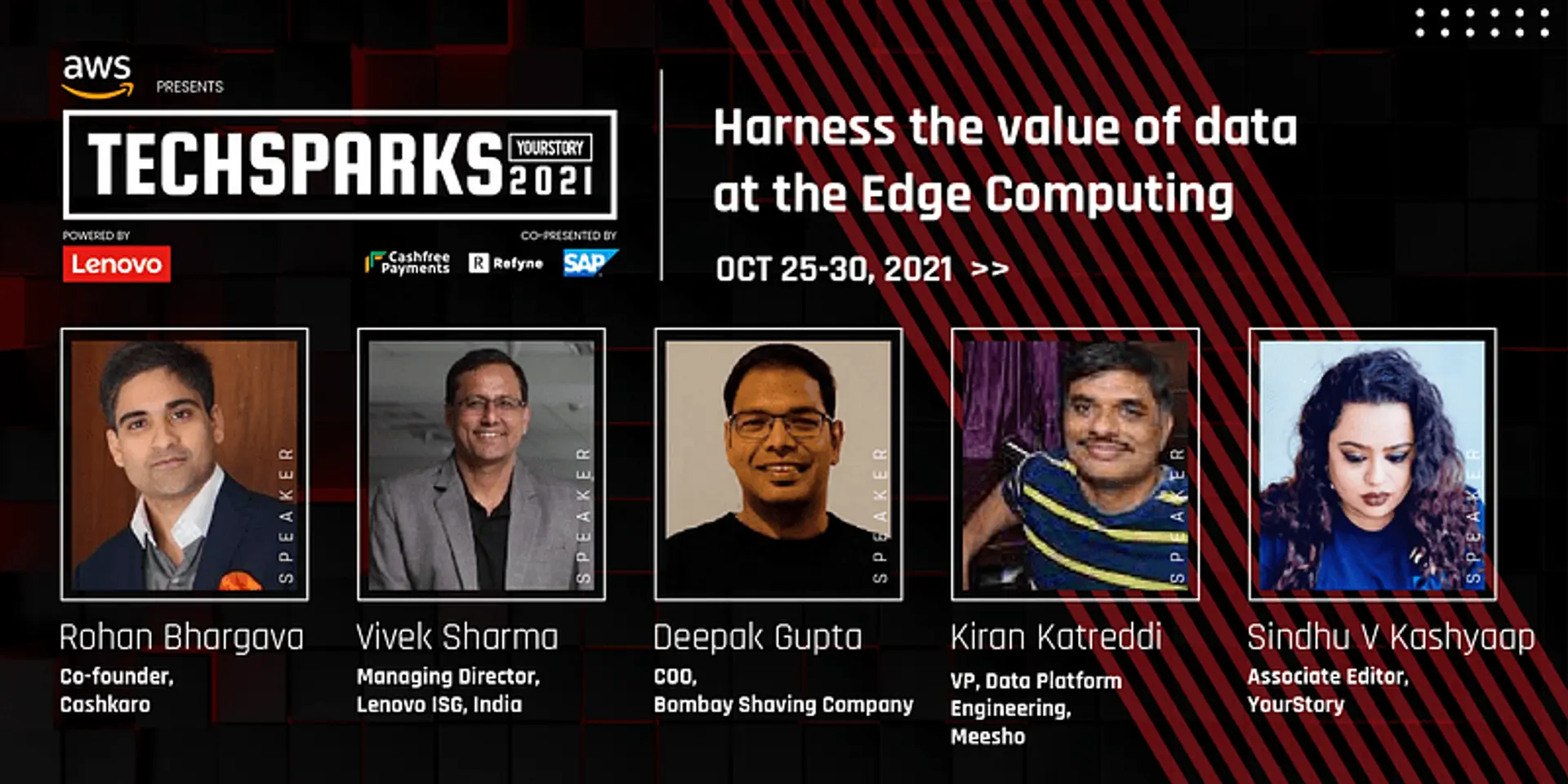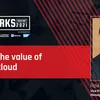Edge Computing is going to change the way we interact with customers, say industry leaders at TechSparks 2021
At TechSparks 2021, leaders from CashKaro, Meesho, Bombay Shaving Company and Lenovo, came together to discuss why Edge Computing will be the future of cloud, and how it will improve customer experience.
After a year marked by lockdowns and social distancing, businesses are revamping their structure to meet the evolving needs of online customers. To deliver a flexible, quick, and secure customer experience, businesses need to bring the applications, along with the underlying processing and storage, closer to where the data is being created. This is where Edge Computing comes into the picture.
Edge Computing introduces compute capability outside the data centre, directly at the edge, where the data is created.
According to reports, India’s data centre market is expected to present a $4.9 billion investment opportunity, following a tripling of data centre capacity by 2025.
"Customer experience is going to change dramatically as we move forward, and Edge is going to play a very crucial role. You need to have the capability to deliver 24x7 across the globe in real-time," said Vivek Sharma, MD, Lenovo Infrastructure Solutions Group, India, while opening the panel 'Edge Computing: Harnessing the value of data' at TechSparks 2021, India's most influential startup-tech conference.
The panel was attended by industry leaders, including Rohan Bhargava, Co-founder, CashKaro; Deepak Gupta, COO, Bombay Shaving Company; and Katreddi Kiran Kumar, Vice President - Data Platform Engineering, Meesho.

Challenges in data management
Rohan said that the Gurugram-based cashback and coupon site, , collects data from different ecommerce platforms to make offers more personalised. The biggest challenge is in getting talent that can understand how to deploy this in the right sense.
"It's re-learning not just at the infrastructure level, but also in marketing and data science. All three channels need to understand the core business requirements and build solutions based on that," he added.
At , while high order volume tells one side of the story, their data has grown 10x every few months. Most of their users come from Tier-II and III cities where bandwidth is still a big constraint. To deal with it, Kiran said that the company designs their systems to not burden end-user and their bandwidth. At the same time, it gives them relevant information to understand customer behaviour and optimise their experience on par with Tier-I customers' experience.
"As an ecommerce company, we have limited control over the edge. We recently built Meshlytics, to create a single interface for all analytics requirements. To respect users' privacy, we don't send to third-party vendors. We keep data closer to where we have full control," said Kiran.
uses AI and Big Data to handle drops across the consumer funnel, improve shelf management, and reduce losses.
"In the first five seconds, we showcase customised assortments to customers. There's also a significant drop from 'add to cart' to 'checkout', and we look at incentivising customers at this point. Thirdly, we use intelligence on shipment, to reduce returns," said Deepak.
The evolution of Edge Computing
Today, customer experience is all about personalisation. "When I want to buy a car, I want to see ads about cars an infinite number of times, versus getting an ad interruption when I don't need it.," said Rohan. He added that at the leadership level, it's about keeping up with technology and infrastructure options. And, changing the thinking for the entire organisation to adopt, by helping them re-learn.
Because of the pandemic, there are many first-time ecommerce businesses as well as users. When Meesho started back in 2015, its mission was to democratise the internet by bringing ecommerce to first-time sellers and buyers. "For the last 1.5 years, we operated differently to meet specific user needs. In villages, we optimise price over convenience. These people are ready to wait for a product until a discount is available," said Kiran.
Deepak said that in India, most B2C brands, especially in the personal care space, will take the omnichannel route, adding, "I want edge computing to help understand customer behaviour in the store as it does online."
Vivek believes that 5G and Edge Computing will open new revenue opportunities across sectors. However, 5G won't be introduced everywhere simultaneously, with some parts of India still surviving on 2G and 3G. He added, "5G will need Edge Computing to drive demand for its services."
According to Vivek, for edge to be successful, it is critical to have a computing performance on par with data centres. Users require integrated storage and data management solutions, along with a compact and versatile design.
However, Edge Computing also presents challenges such as operating in unpredictable environments, compromised device and data security, and deployment and management at scale.
Lenovo solves these issues with its ThinkEdge portfolio which has three devices - data centre, laptop and smart devices, and mobile devices. It provides a ruggedised and environment-friendly experience, ensuring seamless network connectivity experience, security, and deployment.
Personalisation will steer the future
Going forward, Meesho wants to enable 100 million sellers on the platform by 2022. "Our main focus is to optimise the end-user experience on our platform. We also want to do a lot of things at the edge, it may not be on the device, but on the Content Delivery Networks to understand customer intent up front and push the right product to them," said Kiran.
Deepak said that consumers now don't want to buy mass products, rather, they prefer personalised offerings. "Our competition is not with the brands in the same space. We're competing with our consumer's previous experience, to make the current one even better," he added.
Rohan added that the future is going to be about mimicking experiences from the physical world like bargaining, touch and feel, customer returns, etc in the digital world. "As we move towards omnichannel, it's about marrying the offline and online experience to create a seamless customer experience," he added
Vivek concluded, "The next decade is not going to be like anything we have seen in the last century. Businesses will accelerate, human capital will be unleashed in a way never seen before, and the ultimate winner will be the customer."
To log in to our virtual events platform and experience TechSparks 2021 with thousands of other startup-tech enthusiasts from around the world, join here. Don't forget to tag #TechSparks2021 when you share your experience, learnings and favourite moments from TechSparks 2021.
For a line-up of all the action-packed sessions at YourStory's flagship startup-tech conference, check out TechSparks 2021 website.

Edited by Kanishk Singh




